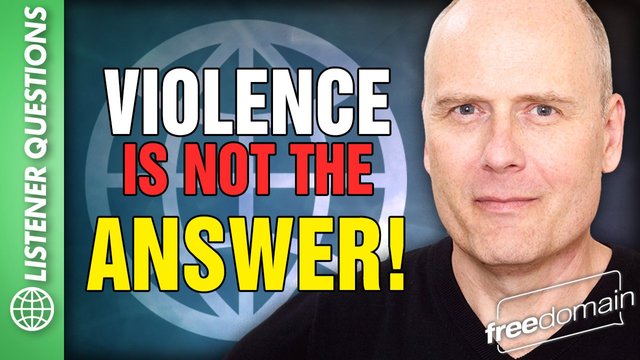"Does my crush love me? I really need to know."
"Do you think we're living in the most advanced civilization that has ever inhabited Earth?"Violence is NOT the Answer!
"King Crimson was at their peak with Wetton, David Cross and Bruford, but Taylor Swift is a billionaire. STEFAN - have you heard Mozart's newly discovered 'A Very Little Night Music'?"
"What's your opinion of Jordan Peterson's work?"
"Is statism collapsing?"
"Is your book available in hardcover?"
"What's your favorite heavy metal band?"
"is the traditional Catholicism the most based thing on the Earth?"
"What happened to your YouTube channel?"
"Do you think these problems with NAP can be resolved?
"The Non-Aggression Principle (NAP), is a libertarian ethical stance that argues that aggression—defined as the initiation of force or fraud against another person's property or person—is inherently immoral. While the principle has intuitive appeal, it faces significant philosophical, practical, and ethical challenges that undermine its universality and application.
"1. Ambiguity in Defining "Aggression"
"Subjectivity of Aggression: The NAP relies on a clear definition of "aggression," yet many actions can be interpreted as aggressive or non-aggressive depending on perspective. For instance:
"If someone refuses to vaccinate during a pandemic, is that an act of aggression by endangering others' health, or is forcing them to vaccinate aggression?
"Pollution from a factory might harm others, but is it aggression if the harm is indirect and unintended?
"This ambiguity makes it difficult to apply the NAP consistently.
"2. Lack of a Mechanism for Collective Action
"Addressing Collective Problems:
"The NAP is highly individualistic and struggles to address issues that require collective solutions, such as environmental protection, public health, or infrastructure.
"For example:
"Climate change results from aggregate actions that harm others, yet enforcing emissions reductions could be seen as an initiation of force against individuals or corporations.
"Public goods like roads, education, and defense require taxation, which the NAP might label as aggression, leaving no clear path to fund or manage such necessities.
"3. Assumes Absolute Property Rights
"Property Rights Are Not Universally Agreed Upon: The NAP assumes that property rights are fundamental and self-evident, yet property systems are human constructs that vary across cultures and contexts.
"For example:
"Indigenous communities often view land as communal rather than private, making the enforcement of private property rights in such contexts potentially aggressive.
"Historical Injustice: Many property holdings result from historical aggression (e.g., colonization, slavery). The NAP offers no clear guidance on addressing these injustices because enforcing reparations could violate the principle.
"4. Fails to Account for Power Imbalances
"Inequality and Coercion:
"The NAP does not account for systemic power imbalances that can lead to de facto coercion without overt aggression.
"For example:
"A worker "choosing" between starvation and accepting exploitative labor conditions may not face physical aggression, but their choices are constrained by economic coercion.
"Corporate monopolies can dominate markets and restrict freedom without violating the NAP, yet they create conditions of harm or dependency.
"5. Incompatibility with Emergency Situations
"Moral Exceptions: The NAP struggles with situations where initiating force might be morally justified or necessary to prevent greater harm.
"For example:
"Breaking into a cabin to survive in a blizzard technically violates the NAP but might be considered ethically justifiable.
"Preventive action, such as disarming someone threatening violence, could be seen as aggression under the NAP, even if it avoids greater harm.
"6. Over-Simplification of Ethics
"Moral Complexity: Ethical decision-making often involves balancing competing values, such as individual rights, collective welfare, and justice. The NAP reduces morality to a single principle, ignoring the complexity of real-world dilemmas.
"Utilitarian Concerns: Following the NAP rigidly could lead to suboptimal outcomes, such as allowing preventable suffering or harm if addressing it would require "aggression."
"7. Practical Limitations
"Enforcement Dilemmas: Even within a system governed by the NAP, enforcing the principle requires some authority to define and address aggression. For instance:
"Resolving disputes over property boundaries or contractual breaches might involve coercive mechanisms, contradicting the NAP.
"A purely voluntary system lacks a practical means of ensuring compliance or protecting vulnerable individuals from exploitation or harm.
"8. Historical and Theoretical Criticism
"Historical Evidence: Societies that have operated on principles akin to the NAP (e.g., laissez-faire capitalism) have often resulted in significant inequality, exploitation, and harm, suggesting that the principle is insufficient for creating equitable or stable societies.
"Philosophical Counterarguments: Thinkers like Karl Marx or John Rawls argue that focusing solely on individual rights and property ignores the broader social and structural forces that shape human relationships and justice.
"While the Non-Aggression Principle provides a simple and appealing ethical framework, its oversimplification of complex moral and social issues renders it problematic in practice. It fails to account for ambiguous definitions of aggression, systemic power imbalances, collective action needs, and situations where initiating force might prevent greater harm. Ultimately, the NAP's rigid adherence to individual rights and property neglects the interconnected and nuanced realities of human society."
"when next bitcoin roundtable?"
GET MY NEW BOOK 'PEACEFUL PARENTING', THE INTERACTIVE PEACEFUL PARENTING AI, AND AUDIOBOOK!
https://peacefulparenting.com/
Join the PREMIUM philosophy community on the web for free!
Also get the Truth About the French Revolution, multiple interactive multi-lingual philosophy AIs trained on thousands of hours of my material, as well as targeted AIs for Real-Time Relationships, BitCoin, Peaceful Parenting, and Call-Ins. Don't miss the private livestreams, premium call in shows, the 22 Part History of Philosophers series and much more!
See you soon!
